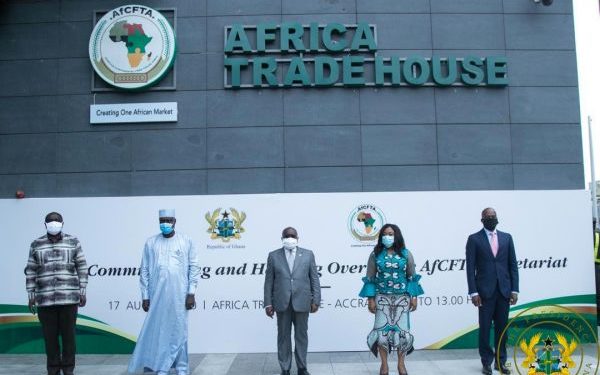The African Continental Free Trade Area (AfCFTA) agreement was signed on March 21, 2018 by 44-member countries to create a continental market for goods and services, with free movement of people and capital; as well as facilitate space for the creation of a Customs Union.
This trade area is expected to unite Africa’s human population of 1.3 billion, in a $ 3 trillion economic potential, with a consequential economic benefit of making Africa the world’s largest free trade area, since the formation of the World Trade Organization. AfCFTA in Ghana, must be localized to benefit the nation.
The main objective of the AfCFTA is to expand intra-African trade through better harmonization and coordination of trade liberalization across the continent. The AfCFTA is further expected to enhance competitiveness at the industry and enterprise levels through exploitation of opportunities for scale production, continental market access and better reallocation of resources.
READ ALSO: Africa is open for business as President hands over AfCFTA secretariat
Industrializing through AfCFTA
In order to break the Guggisberg colonial economic model to a more functional and structured trade driven economy, we need to stimulate industry profiling to determine which kind of industries are operating in Ghana, and what they produce to guide us identify, what we are selling to Africa through the AfCFTA model.
We can achieve this through engaging the trade agencies under the Ministry of Trade and District Assemblies, where these industries operate from or through the Registrar Generals’ Department. The profiling will help the country fully benefit from AfCFTA through a structured system because as country we can easily determine which industries are bringing the state revenue from the AfCFTA model.
We need to also tie in the 1 District 1 Factory policy to AfCFTA by establishing factories that can serve the underserve trade areas of the African market. This we can do by empowering local industries to scale up their production.
Key to the above is to improve trade facilitation to boost trade and reduce costs. Ghana could take a number of steps to achieve this by making sure all customs locations have information technology systems that support core processes and can be used by traders and officials without compromising on custom rules and regulations.
COVID-19 Lessons and the New Trade Normal
Covid-19 has taught the world that, you don’t need to be physically present in a particular country to do business. It has removed all physical trade barriers and reaffirm the need to trade virtually. In view of that, to effectively benefit from AfCFTA, we need to establish an online trade portal that will enable our neighboring African countries trade with Ghanaian businesses virtually.
This virtual platform will be called the Ghana Trade Mall with a single goal of bringing together Ghanaian businesses to connect with prospective trade partners across the continent. This platform will connect with our port and banking system to allow for easier export activities and payment. To achieve this, the Ministry of Trade must show leadership by collaborating with Ghana Investment Promotion Centre (GIPC), Ghana Free Zones Board (GFZB), National Board for Small Scale Industries (NBSSIs), Ghana National Chamber of Commerce (GNCC) and other relevant stakeholders to establish this common platform.
Through this platform, Ghanaian business can reduce trade cost and time which will make them more profitable and on top of the continent with regards to trade and industry.

Author’s Bio
Emmanuel Owusu is Policy Analyst with considerable knowledge and expertise in local economic development, policy formulation and strategic management.
He is currently the Executive Director of Movement for Responsible and Accountable Governance (MoRAG), a civil society organization.
Contact the Author on 0248110208, emmaowusu60@gmail.com







